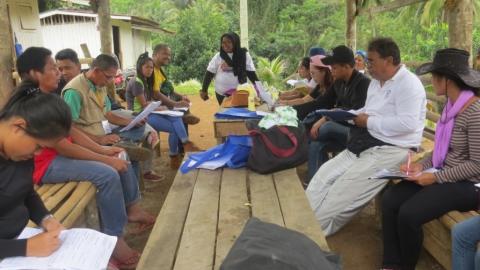MOCK INSPECTION – participants review and process their inspection forms during the mock inspection for Organic Third Party Certification at Aga Sayo Diversified Farm, Cayontor, Kauswagan, Lanao del Norte. The mock inspection is part of the activity for the Training on ICS for Smallholder Groups.
KAUSWAGAN, LANAO DEL NORTE – Farmers, community organizers, agricultural extension workers and the Local Government Unit of Kauswagan, Lanao del Norte joined together to install an Internal Control System (ICS) on organic agriculture for the organic agriculture practitioners in the municipality.
Agricultural Training Institute – Regional Training Center X (ATI – RTC X) conducted the training on ICS for Smallholder Groups last March 4 – 8, 2019 at Dona Laureana Rosales School of Practical Agriculture, in Kauswagan, Lanao del Norte.
The installation of the ICS is a requirement for organic third party certification. The role of ICS is to be an official “control body”. This implies that certain basic requirements for organic inspection needs to be fulfilled. There should be a single organic system plan for the group and that, individuals group members use the certification system. Likewise, similar production methods and inputs are used on all farm plot in the group.
Standard inspection protocols are integral for the implementation of ICS. The installation of ICS for smallholder group has many requirements which include (1) written procedures and forms (ICS manual), (2) understanding risk assessment and critical control points, (3) internal organic standards, (4) internal control and approval procedures, (5) organized group structure, (6) human resource training and development schemes and (7) established product protocol, among others.
Participants to the training include upland rice farmers, peanut growers, vegetable farmers, and community organizers. Each of the participant has a vital role for the installation of the ICS.
The training has four Phases. Phase 1 focuses on the installation requirements and comprehensive appreciation of the principles of organic agriculture and the elements of ICS. Phase 2 involves the training of the ICS staff. Phase 3 is the On-the-Job training for members of the ICS. Phase 4 focuses on the evaluation of the ICS. It aims to determine the completion and readiness of the organization for application for certification. The participants have completed Phase 1, Phase 2, and parts of Phase 3 and Phase 4. Follow up trainings and activities will be conducted to fully comply and complete the 4 Phases.
Resource persons to the training were Mr. Reynaldo Gil G. Lomarda and Lonalyn A. Sulatan, both from Greenminds, Inc., an External Service Provider (ESP) of ATI 10. Topics to the training include the Salient points and Relevant Regulations of RA 10068, Philippine National Standards (PNS) on Organic Agriculture, Organic Certification, Smallholder Group Certification, Internal Control System (ICS) & steps in Installing, Procedures, Forms and Processes, Internal Report Integration, Internal Approval, ICS Documentation, and a Workshops on the ICS manual, among others.
Highlighted in the training is the visit to the Aga Sayo Diversified Farm for the mock inspection for the organic certification. Aga Sayo Farm is a beneficiary of the “From Arms to Farms Program” of ATI.
Mr. Peter M. Jubas, a participant to the training, is very thankful that he was invited to the training. “This training will help me a lot. It is not easy to have an ‘organic’ certified product. I have learned from this training that it will still undergo a tedious process. But, at least, this training is a very huge step to have our products certified as ‘organic’,” he said. “With the help of our ever supportive LGU, we know we can do this,” he added.
The Municipal Government of Kauswagan is a member of the League of Organic Agriculture Municipalities and Cities in the Philippines (LOAMC – PH) and Kauswagan Mayor Rommel Arnado is currently the President of the organization. (with reports from Javier P. Andalan)

